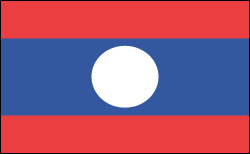Laos History


Coalition Government Is Short-Lived
But North Vietnam, the U.S. (in the form of CIA personnel), and China remained active in Laos after the settlement. North Vietnam used a supply line (Ho Chi Minh Trail) running down the mountain valleys of eastern Laos into Cambodia and South Vietnam, particularly after the U.S.–South Vietnamese incursion into Cambodia in 1970 stopped supplies via Cambodian seaports.
An agreement reached in 1973 revived the coalition government. The Communist Pathet Lao seized complete power in 1975, installing Souphanouvong as president and Kaysone Phomvihane as prime minister. Since then, other parties and political groups have been moribund and most of their leaders have fled the country. The monarchy was abolished on Dec. 2, 1975, when the Pathet Lao ousted the coalition government and King Sisavang Vatthana abdicated.
The Supreme People's Assembly in Aug. 1991 adopted a new constitution that dropped all references to socialism but retained the one-party state. In addition to implementing market-oriented policies, the country has passed laws governing property, inheritance, and contracts.







